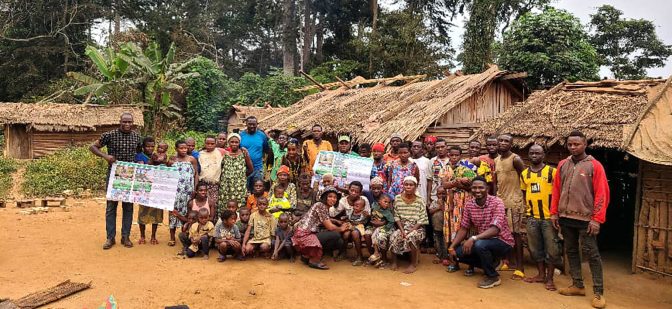Sharing the Wild: Addressing Health Risks in Cameroon’s Bushmeat Trade
Deep in the lush forests of southern Cameroon, a story unfolds – one that intertwines tradition, sustenance, and the constant threat of hidden dangers. For generations, communities have turned to wild game as a vital source of food and income. Yet, this age-old practice carries an unseen risk: the potential to transmit diseases from animals to humans. It’s a silent threat known as zoonotic disease which can range from common foodborne illnesses to rarer, deadly viruses like Ebola.
"We aimed to understand the extent to which people were aware of these risks and if they possessed the knowledge necessary to avoid exposure," explained Amy Ickowitz, who led the project.
Researchers embarked on a comprehensive study, interviewing nearly 2,400 individuals across 44 villages surrounding protected areas. Their goal was to bridge the knowledge gap surrounding wild meat and its potential health consequences. The results painted a concerning picture. While hunting played a critical role in crated these areas?
"There’s a.”
Seeking Solutions Through Collaborative Storytelling
Recognizing that simply informing communities was not enough, researchers took a collaborative approach. They interacted with local leaders, healthcare officials, and hunters from multiple villages. This co-creation workshop yielded valuable insights. “The people lived simply asking them to stop.
A Threefold Approach: Shared Knowledge, Reinvented Tools, and Lasting Change
A: This explanation provided was good but we can make it then */,
The key became fostering change through education and accessible solutions. The creation of image-based learning materials with clear, concise captions became essential.
A bit of basic math could save lives: nearly 2,400 individuals throughout 44 villages were interviewed, each holding unique perspectives formed during the lifespan of hunting as a primary use. Simply stating the dangers posed by wild meat wasn’t enough. It was time to equip villagers with knowledge, renovate familiar hunting tools to reduce risk, and share practical tips to ensure safety: "Four out of 10 people confessed to using meat from visibly sick animals. This highlights need for culinary education."
Metadata and Keywords
Employ both specific keywordsfighting as a driver of safer practices. ("zoonotic diseases," "bushmeat," "wild meat," "Cameroon," "wildlife trade," "health risks," "public health").*
## Cameroon’s Bushmeat Trade: Balancing Tradition and Health Risks
Traditional hunting practices are deeply woven into the fabric of Cameroonian society, providing both sustenance and income for many communities. Though, the bushmeat trade also presents a critically important risk of **zoonotic disease transmission**.
In a bid to understand and address these health concerns, researchers led by Dr. Amy Ickowitz conducted a groundbreaking study across 44 villages in southern Cameroon. their findings underscored the urgent need for education and practical solutions to mitigate the risks associated with wild meat consumption. Today, we delve deeper into their research with Dr. Ickowitz,Lead Research Scientist at the Centre for International Forestry Research (CIFOR),and Dr. Aaron Tassi, a Cameroonian veterinarian with expertise in zoonotic diseases.
**Understanding the Scope of the Risk:**
**dr. Ickowitz:** Our study, involving nearly 2,400 individuals, revealed a concerning lack of awareness regarding the health risks associated with the bushmeat trade. While hunting is deeply entrenched in these communities’ way of life, many were unaware of the potential for disease transmission from animals to humans.
**Dr. Tassi:** Zoonotic diseases like Ebola and Marburg, proven to be present in Cameroon’s wildlife, are a serious threat. The lack of proper handling and preparation techniques during hunting, butchering, and cooking significantly increases the risk of exposure.
**Bridging the Knowledge Gap:**
**World Today news:** How did the research team address this knowledge gap?
**Dr. Ickowitz:** We adopted a collaborative approach, working closely with local leaders, healthcare professionals, and hunters. Together, we developed educational materials using images and simple captions, ensuring accessibility for individuals with varying literacy levels.
**Dr.Tassi:** These materials explicitly outline safe handling practices,from field dressing to cooking techniques that effectively kill potential pathogens.
**Empowering Communities through Tool Innovation:**
**World Today News:** What other practical solutions did the research propose?
**Dr. Ickowitz:** We sought to address the problem at its source by collaborating with local blacksmiths to redesign hunting tools.
These modified tools incorporate safer features that minimize contact with animal fluids during the butchering process.
**Dr. Tassi:** For example,
we designed longer knives and hooks to help hunters maintain a safe distance from possibly infected areas.
**Looking Ahead:**
**World Today News:** What are the long-term implications of this research?
**Dr. Ickowitz:** Our aim is to create a sustainable model for integrating public health measures into traditional practices. We hope to see widespread adoption of these safer practices, ultimately reducing the risk of zoonotic disease transmission in Cameroon and beyond.
**Dr. Tassi:** Ultimately, this research highlights the critical need for continued collaboration between
researchers, local communities, and public health officials to ensure
a balance between cultural traditions and the health and well-being of both humans and wildlife.
**Take Action:**
The bushmeat trade presents a complex challenge with far-reaching implications. Learn more about zoonotic diseases and support organizations working to mitigate the risks associated with wildlife trade.
**Further reading:**
* [World Health Association: Zoonotic Diseases](https://www.who.int/news-room/fact-sheets/detail/zoonoses)
* [Center for International Forestry Research (CIFOR)](https://www.cifor.org/)


